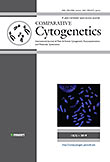
Comparative Cytogenetics
Scope & Guideline
Pioneering Insights in Cytogenetic Dynamics
Introduction
Aims and Scopes
- Karyotypic Analysis:
A core focus of the journal is the detailed karyotypic analysis of various species, which includes the examination of chromosome number, structure, and morphology, contributing to the understanding of genetic diversity and evolutionary relationships. - Comparative Genomics:
The journal often features studies that involve comparative genomics, where the genomic data of different species are analyzed to identify genetic similarities and differences, providing insights into evolutionary processes. - Molecular Cytogenetics:
Research involving molecular cytogenetics, including the use of techniques such as fluorescent in situ hybridization (FISH) and DNA sequencing, is prevalent, facilitating a deeper understanding of chromosomal organization and gene mapping. - Ecological and Evolutionary Implications:
Many papers explore the ecological and evolutionary implications of cytogenetic findings, linking chromosomal variations to adaptation, speciation, and environmental interactions. - Polyploidy and Chromosomal Evolution:
The journal addresses topics related to polyploidy and chromosomal evolution, investigating how these phenomena influence species diversification and genetic stability.
Trending and Emerging
- Integrative Approaches:
There is an increasing trend towards integrative approaches that combine cytogenetics with molecular biology, ecology, and evolutionary biology, allowing for more comprehensive insights into the genetic basis of traits and adaptation. - Focus on Polyploidy and Its Implications:
Emerging research on polyploidy is gaining traction, particularly its role in speciation and adaptation, as more studies investigate the evolutionary significance of polyploid species across different taxa. - Applications in Conservation Genetics:
A notable increase in studies applying cytogenetic methods to conservation genetics has been observed, emphasizing the need to understand genetic diversity and population structure for effective conservation strategies. - Chromosomal Mapping of Repetitive DNA:
The mapping of repetitive DNA sequences is becoming a focal point, as researchers aim to understand chromosomal architecture and its implications for genome evolution and function. - Cytogenomics:
The integration of cytogenetics with genomics, termed cytogenomics, is emerging as a vital area of research, reflecting the need for comprehensive genomic data that complements cytogenetic findings.
Declining or Waning
- Traditional Cytogenetic Techniques:
There seems to be a waning interest in traditional cytogenetic techniques, such as simple karyotyping without molecular tools, as researchers increasingly adopt more advanced molecular methods that provide richer data. - Chromosomal Studies in Less Explored Taxa:
Research focusing on chromosomal studies in less explored or more obscure taxa appears to be less frequent, possibly due to a shift towards more economically or ecologically significant species that offer clearer implications for conservation and management. - Basic Chromosome Number Reporting:
The publication of papers solely reporting basic chromosome numbers without extensive comparative analysis or ecological context is decreasing, suggesting a move towards more integrative and comprehensive studies.
Similar Journals

GENOME RESEARCH
Pioneering Insights in Genomic TechnologiesGenome Research, published by Cold Spring Harbor Laboratory Press, stands as a premier journal in the field of genetics, featuring rigorous peer-reviewed research that explores the complexities of genome organization and function. With an impressive Q1 ranking in both Genetics and Clinical Genetics according to the 2023 category quartiles, this journal effectively bridges the gap between fundamental genetic science and its clinical applications. Its significance is further highlighted by its Scopus rankings, where it ranks #6 out of 99 in Clinical Genetics and #27 out of 347 in Biochemistry, Genetics, and Molecular Biology, showcasing its broad influence and access to cutting-edge discoveries. Researchers and professionals can look forward to a diverse array of articles that cover genomic technologies, bioinformatics, and translational genomics. Although not currently open access, the wealth of information available in each issue makes it an invaluable resource for anyone engaged in genetic research and applications.
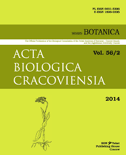
ACTA BIOLOGICA CRACOVIENSIA SERIES BOTANICA
Elevating botanical knowledge for a sustainable future.ACTA BIOLOGICA CRACOVIENSIA SERIES BOTANICA is a distinguished journal published by the Polska Akademia Nauk (Polish Academy of Sciences), with its roots tracing back to 1996. As a pivotal publication in the field of Plant Science, it serves to disseminate high-quality research and findings, contributing to the ongoing development and understanding of biodiversity, plant ecology, and conservation. The journal is indexed under Scopus, ranked #203 out of 516 in its category, placing it in the 60th percentile and firmly within Q3 quartile for Plant Science in 2023. Researchers, professionals, and students will find invaluable content within its pages, enhancing their knowledge and supporting academic exploration. Although it currently does not offer open access options, the journal remains a crucial resource for those engaged in botanical sciences, with a commitment to advancing scholarship in Poland and beyond.

GENETICA
Advancing the Frontiers of Genetic ResearchGENETICA is a prominent journal published by SPRINGER, dedicated to advancing the field of genetics and its applications across various biological disciplines, including animal science, plant science, and insect science. Since its inception in 1919, the journal has consistently served as a vital platform for researchers and professionals to disseminate high-quality research findings that explore the genetic bases of biological phenomena. With its current scope spanning from 1943 to 2024, GENETICA holds a commendable position in the academic community, as evidenced by its Q2 ranking in both animal science and insect science, and its active contribution to interdisciplinary studies in genetics. Although the journal does not offer open access, it remains accessible through institutional subscriptions and libraries, ensuring its vital research is widely circulated. Researchers, professionals, and students alike will find GENETICA an invaluable resource for the latest discoveries and methodologies in the ever-evolving landscape of genetics.

Molecular Cytogenetics
Empowering Researchers through Open Access Knowledge.Molecular Cytogenetics is a prestigious open-access journal published by BMC, dedicated to advancing the fields of biochemistry, genetics, and molecular biology. Since its inception in 2008, this journal has facilitated prominent research and developments in the cytogenetics domain, featuring innovative studies and reviews that explore the intricate relationship between cellular structures, genetic makeup, and various biological processes. With a robust impact factor and a commendable positioning within Q3 and Q4 categories across multiple relevant disciplines, it provides a vital platform for researchers to disseminate their findings to a global audience. The journal's open-access model ensures that cutting-edge research is readily available to students, professionals, and scholars, promoting free knowledge exchange. Situated in the vibrant landscape of the United Kingdom, Molecular Cytogenetics continues to contribute significantly to scientific progress, solidifying its role as an essential resource for those engaged in the exploration of genetic and cytogenetic inquiry.
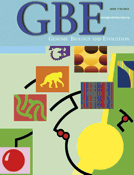
Genome Biology and Evolution
Exploring the Frontiers of Genetics and EvolutionGenome Biology and Evolution, published by Oxford University Press, is a leading open-access journal that has been instrumental in advancing research in the fields of genetics and evolutionary biology since its inception in 2009. With an impressive Q1 ranking in both Ecology, Evolution, Behavior and Systematics and Genetics in 2023, the journal is recognized for its high-quality publications that contribute significantly to the understanding of genomic processes across diverse organisms. As part of its commitment to disseminating impactful research, it is dedicated to fostering interdisciplinary collaboration among scientists and providing a platform for innovative findings. Researchers, professionals, and students alike are encouraged to explore the wealth of knowledge within its pages, contributing to ongoing discussions that shape our understanding of evolutionary mechanisms and genomic data interpretation. With its robust access options and a strong commitment to wide dissemination of research, Genome Biology and Evolution remains an essential resource for anyone engaged in the life sciences.

Evolutionary Bioinformatics
Innovating the intersection of biology and computation.Evolutionary Bioinformatics, published by SAGE Publications Ltd, is a pioneering open-access journal established in 2005, dedicated to advancing the field of evolutionary biology through innovative computational techniques and bioinformatics. With an ISSN of 1176-9343, it serves as a critical platform for researchers, professionals, and students to disseminate impactful findings and foster collaboration across disciplines. The journal spans a broad scope, contributing significantly to the areas of Ecology, Evolution, Behavior and Systematics, and Genetics, as evidenced by its respectable Scopus rankings and quartile placements in 2023. With a commitment to providing comprehensive, peer-reviewed research articles and tools for sharing knowledge, Evolutionary Bioinformatics plays an essential role in shaping the future of evolutionary studies and bioinformatics. Readers and contributors alike are encouraged to engage with cutting-edge research that pushes the boundaries of understanding in this dynamic field.
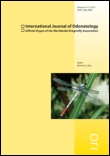
INTERNATIONAL JOURNAL OF ODONATOLOGY
Exploring the Fascinating World of OdonatesINTERNATIONAL JOURNAL OF ODONATOLOGY, published by Wachholtz Verlag GmbH, is a vital resource for researchers and professionals in the fields of Ecology, Evolution, Behavior, and Insect Science. Established in 1998, this journal provides a platform for the dissemination of innovative research pertaining to odonatology, encompassing the ecological and biological interactions of dragonflies and damselflies. With its focus on advancing knowledge within these scientific disciplines, the journal holds a commendable Q3 ranking in Ecology, Evolution, Behavior and Systematics and a Q2 ranking in Insect Science for 2023, reflecting its significance in academic circles. Although it operates without open access, its articles are accessible through institutional subscriptions, allowing for wide dissemination among scholars and practitioners. The journal's commitment to publishing high-quality, peer-reviewed research makes it an authoritative source of information that enriches the study of odonates and their broader ecological contexts. For inquiries, the journal's editorial team can be reached at C/O Fleet7, Fleethorn 7, Kiel 24103, Germany.

Genes
Unveiling the complexities of genes for a better world.Genes is a leading open-access journal published by MDPI that focuses on advancing the field of genetics and genomics. Established in 2010 and based in Basel, Switzerland, this journal has made significant strides in promoting innovative research in both clinical genetics and molecular biology. With an impact factor reflecting its relevance and quality, Genes has been classified in the Q2 quartile for Genetics and the Q3 quartile for clinical Genetics as of 2023. The journal provides an accessible platform for researchers, professionals, and students to disseminate their findings and explore emerging trends across the genetics landscape. Accessible online since its inception, Genes allows for continuous engagement and collaboration within the scientific community, fostering a deeper understanding of genetic mechanisms and their implications in health and disease.
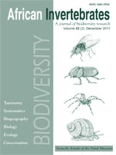
AFRICAN INVERTEBRATES
Unveiling the Secrets of African InvertebratesAFRICAN INVERTEBRATES is a distinguished open-access academic journal published by the COUNCIL NATAL MUSEUM, specializing in the study of invertebrate biology within the vibrant ecosystems of Africa. Operating since 2006, this journal has established itself as a vital resource in the fields of Animal Science, Ecology, Evolution, Behavior, Insect Science, and Paleontology, earning a strong Q2 ranking in these categories as of 2023. With its ISSN 1681-5556 and E-ISSN 2305-2562, the journal provides unrestricted access to cutting-edge research, fostering collaboration among global researchers and professionals. AFRICAN INVERTEBRATES serves not only as a platform for high-quality scholarly articles but also aims to enhance the understanding of Africa's unique invertebrate fauna and the ecological challenges they face. With a commitment to innovation and excellence, the journal is pivotal for those looking to contribute to the discourse surrounding African biodiversity and conservation strategies.
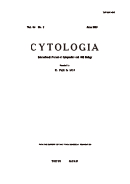
CYTOLOGIA
Unveiling the Secrets of Cytology Since 1929CYTOLOGIA is a prominent academic journal published by University of Tokyo Cytologia, specializing in the fields of Animal Science, Plant Science, Cell Biology, and Genetics. With origins dating back to 1929, this journal has been at the forefront of cytological research and continues to contribute to advancements in both basic and applied sciences. As of 2023, it holds a respectable position in various Scopus categories, with a Q3 ranking in Animal Science and Zoology and Plant Science, alongside Q4 rankings in Genetics and Cell Biology, reflecting its dedication to quality research dissemination. While currently not an Open Access journal, CYTOLOGIA provides critical insights and findings that are pivotal for researchers, professionals, and students aiming to further their understanding of cytology and its applications in diverse biological fields. With a historical legacy and ongoing relevance, CYTOLOGIA remains a vital resource for anyone engaged in cutting-edge research or seeking comprehensive knowledge in the biological sciences.